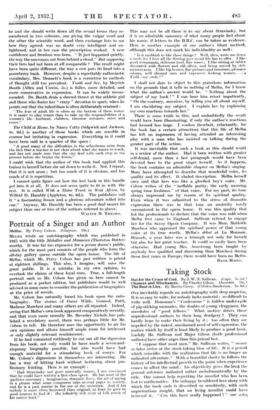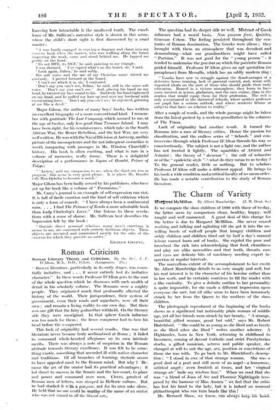Taking Stock
ONE inevitably regards an autobiography with deep suspi • It is so easy to write, for nobody lucks material ; so difficult to write well. Rousseau's " Confessions " is hidden widera pile of pig-sticking memories, the doubts of young clergymen, the anecdotes of "good fellows." What motive drives these unprofessional authors to their long drudgery ? They ran hardly hope to make their living by it ; too often they are impelled by the naked, unashamed need of self-expresSion, the motive which by itself is least likely to produce a good book. Luckily Mr. Sullivan and Major Gilson (both professional authors) have other urges than this primal lust.
" I suppose that most men," Mr. Sullivan writes, " sooner or later arrive at the stock-taking time of life. It is a period which coincides with the realization that life is no longer an unlimited adventure." With a beautiful clarity he follows the history of his intellectual growth to the point when experience ceases to affect the mind ; his objectivity gives the book the general reference indicated rather melodramatically by the title. One cannot help regretting the novelist who has been lost to mathematics. The unhappy bewildered love story with which the hook ends is described so sensitively, with such unpretentious insight, that no living novelist could have bettered it. " Can this have really happened ?" one asks, knowing how intractable is the unaltered truth. The excel- lence of Mr. Sullivan's narrative style is shown in this scene. where the child's • short sight is first discovered by :a cruel.
muster :
" I was busily engaged in copying a diagram and chant into my, exercise book when the master, who was walking along the forms inspecting the work, came and stood behind me. He tapped me
gently on the head. Its not DM its D EF,' ho said, pointing to my triangle.
• I was alarmed. ' I've copied what's on the board, sir,' I said. Look again, Julian,' he said softly. • Mitt soft voice and the use of my Christian name stirred me curiously. I peered forward at the board.
I can't see which it is, sir,' I confessed. • • •
` Don't say you can't see, Julian,' he said, at-ill in the same soft voice. ' Don't say you can't see.' And, placing his band on my head, he twisted my face round to his. Suddenly his hand tightened on my head, and he pulled my hair upend over my forehead with excruciating force. Don't say you can't see,' lie repeated, grinning at me like a devil."
' Major Gilson, the author of many boys' books, has written an excellent biography of a more conventional kind. I remem- ber with gratitude The Lost Company, which seemed to me, at the age of twelve, only less good than Treasure Island. I may have been right, for his reminiscences, which take in the South African War, the Boxer Rebellion, and the last War, are very well written. He was with theNaval Division at Antwerp, and his picture of the incompetence and the not infrequent cowardice is worth comparing with passages in Mr. Winston Churchill's history. His book is often exciting, and what is rare in a volume of memories, really funny. There is a delightful description of a performance in Japan of Handel, Prince of
Tokyo:
" ' Listen,' said my companion to me, when the third act was in progress,' this scene is very good please. It is where Mr. Hamlet tells Miss Ophelia to become a monk."
Major Gilson has been badly served by his publishers, who have gut up his book like a volume of " Poonaisms."
Mr. Carey's journal is an example of self-expression run riot. It is full of facile emotion and the kind of self criticism which is only a form of conceit. " I have always been a sentimental
man. I find The Prisoner of Zenda a inure admirable book than Lady Chatterley's Lover." One listens to these revels-. Bons with a sense of shame. Mr. Sullivan best describes the impression left by the book : " Outside direct personal relations many inen's emotions, it seems to me, are concerned with entirely fictitious objects. These objects are invented and maintained merely for the sake of the emotion for which they provide an outlet."
GRAUAAI GHEENV,

































 Previous page
Previous page